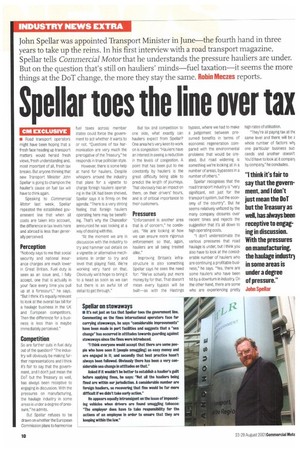Spellar toes the line over tax
Page 10

If you've noticed an error in this article please click here to report it so we can fix it.
John Spellar was appointed Transport Minister in June—the fourth hand in three years to take up the reins. In his first interview with a road transport magazine, Spellar tells Commercial Motor that he understands the pressure hauliers are under. But on the question that's still on hauliers' minds—fuel taxation—it seems the more things at the DoT change, the more they stay the same. Robin Meczes reports.
CM EXCLUSIVE
• Road transport operators might have been hoping that a fresh face heading up transport matters would herald fresh views, fresh understanding and, most important of all, fresh tax breaks. But anyone thinking that new Transport Minister John Speller is going to champion the haulier's cause on fuel tax will have to think again.
Speaking to Commercial Motor last week, Speller repeated the established government line that when all costs are taken into account, the difference in tax levels here and abroad is less than generally perceived.
Perception
"Nobody says to me that social security and national insurance charges are much lower in Great Britain. Fuel duty is seen as an issue and, I fully accept, one that is actually in your face every time you pull up at a forecourt," he says. "But I think it's equally relevant to look at the overall tax bill for a haulage business in the UK and European competitors. Then the difference for a business is less than is maybe immediately perceived."
Competition
So are further cuts in fuel duty out of the question? "The industry will obviously be making further representations and I think it's fair to say that the government, and I don't just mean the DoT but the Treasury as well, has always been receptive to engaging in discussion. With the pressures on manufacturing, the haulage industry in some areas is under a degree of pressure," he admits.
But Speller refuses to be drawn on whether the European Commission plans to harmonise fuel taxes across member states could force the government to act whether it wants to or not. "Questions of tax harmonisation are very much the prerogative of the Treasury," he responds in true politician style.
However, there is some help at hand for hauliers. Despite whispers around the industry that plans for a vignette to charge foreign hauliers operating in the UK had been shelved, Speller says it is firmly on the agenda: "There is a very strong feeling that foreign hauliers operating here may be benefiting. That's why the Chancellor announced he was looking at a way of dealing with this.
"At the moment we are in discussion with the industry to try and hammer out details on a vignette or alternative mechanisms in order to try and level that playing field. We're working very hard on that. Obviously we'd hope to bring it to a head as soon as we can but there is an awful lot of detail to get through." But tax and competition to one side, what exactly can hauliers expect from Speller? One area he's very keen to work on is congestion: "Hauliers have an interest in seeing a reduction in the levels of congestion. A point that has been put to me constantly by hauliers is the great difficulty being able to predict the length of journeys. That obviously has an impact on them, on their drivers' hours, and is of critical importance to their customers.
Pressures
"Enforcement is another area that is of concern," he continues. "We are looking at how we can ensure more rigorous enforcement so that, again, hauliers are all being treated alike."
Improving Britain's infrastructure is also something Speller says he sees the need for: "We've actually put more money by for that. That doesn't mean every bypass will be built—as with the Hastings bypass, where we had to make a judgement between presumed benefits in terms of economic regeneration compared with the environmental problems that would be created. But road widening is something we're looking at in a number of areas, bypasses in a number of others."
Speller recognises that the road transport industry is "very significant, not just for the transport system, but the economy of the country". But he seems relatively unfazed by the many company closures over recent times and rejects the suggestion that it's all down to high operating costs.
"I don't underestimate the various pressures that road haulage is under, but I think you also have to look at the considerable number of hauliers who are continuing a profitable business," he says. "Yes, there are some hauliers who have been hit by a downturn in industry. On the other hand, there are some who are experiencing pretty high rates of utilisation.
"They're all paying tax at the same level and there will be whole number of factors wh one particular business suc ceeds and another doesn't You'd have to look at it compan) by company," he concludes.




























































































































